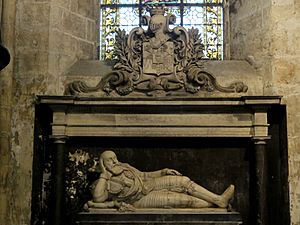William Douglas, 10th Earl of Angus facts for kids
Quick facts for kids
William Douglas
|
|
|---|---|
| Earl of Angus | |

Tomb of the 10th Earl of Angus
|
|
| Predecessor | William Douglas, 9th Earl of Angus |
| Successor | William Douglas, 11th Earl of Angus |
| Other titles | Lord Abernethy Lord Bonkyll & Preston Lord Jedburgh Forest |
| Born | 15 March 1554 |
| Died | 3 March 1611 Paris, France |
| Buried | Abbey of Saint-Germain-des-Prés |
| Noble family | Angus |
| Spouse(s) | Lady Elizabeth Oliphant |
| Issue |
|
| Father | William Douglas, 9th Earl of Angus |
| Mother | Egidia Graham |
William Douglas, 10th Earl of Angus (1554–1611) was an important Scottish nobleman. He was the son of William Douglas, 9th Earl of Angus. William Douglas was related to King James I through his grandmother, Agnes Keith, Countess of Moray.
Contents
Life and Times of William Douglas
William Douglas was born in 1554. He lived during a time of big changes in Scotland. He was a powerful figure in Scottish politics.
Early Life and Education
Douglas studied at St. Andrews University. After his studies, he worked for the Earl of Morton. Later, he visited the French court. While in France, he became a Catholic. When he returned to Scotland, he was put under house arrest. He also lost his right to inherit his family's wealth for a short time.
Becoming the Earl of Angus
Despite earlier problems, Douglas became the Earl of Angus in 1591. He took over his father's titles and lands. In 1592, he faced trouble again. He was involved in a secret plan with Lord Bothwell. He was briefly disgraced but soon set free.
The King, James VI, then made him his Lieutenant in northern Scotland. This meant he was the King's representative there. In June 1592, he had an accident while hunting. He fell from his horse and was injured.
Political Challenges and Faith
In July 1592, Douglas sought help from Queen Elizabeth. He was part of a plan with other lords. This plan was against John Maitland, the Chancellor of Scotland. He was accused of meeting with rebels.
Douglas said he refused offers from Spain. However, in October, he signed a document called the Spanish Blanks. This document was a secret agreement with Spain. When this was discovered, he was arrested. He was put in Edinburgh Castle in January 1593.
Escape and Rebellion
Douglas escaped from Edinburgh Castle on February 13, 1593. His wife, the Countess, helped him. He then joined other rebellious earls in the north. The King offered them a deal. They could be forgiven if they changed their religion. They also had to leave Scotland.
They refused these terms. So, they were declared traitors. They continued to rebel against the King. In July 1594, they attacked Aberdeen. This made King James very angry. The King himself went north to stop them. Douglas also tried to attack Edinburgh. But his plan with the Earl of Bothwell failed.
Return to Royal Favor
Later, in 1597, the rebellious earls changed their minds. They all said they would become Presbyterians. This meant they would follow the main Protestant church in Scotland. Because of this, they got their lands and titles back.
Angus was again part of the Privy Council. This was a group of advisors to the King. In June 1598, he became the King's Lieutenant in southern Scotland. He worked hard in this role. He led a campaign against the Johnstones, called the "Raid of Dumfries."
At Christmas in 1598, people noticed something. They thought Angus wore a cross-like jewel in his hat. This made some wonder if he was still Catholic. But the King laughed and said it was not true.
Later Life and Exile
Angus became upset when another lord, Huntly, gained a higher title. He then changed his mind about his religion again. He refused to listen to ministers. Because of this, he was removed from the church in 1608.
In 1609, Douglas decided to leave Scotland. He went to live in another country. He died in Paris, France, on March 3, 1611. He was 57 years old. He is buried at the Abbey of Saint-Germain-des-Prés. A large monument was built there to remember him.
Family Life
William Douglas married Elizabeth Oliphant in 1585. She was the daughter of Lawrence, 4th Lord of Oliphant. They had three sons and three daughters together.
Their second son, James, later became Lord Mordington. Their daughter Mary married Alexander Livingston, 2nd Earl of Linlithgow.
| Name | Birth | Death | Notes |
|---|---|---|---|
| William Douglas, 1st Marquess of Douglas | 1589 | 19 February 1659 | Married Lady Margaret Hamilton and Lady Mary Gordon; had children. |
| James Douglas, 1st Lord Mordington | 1591 | 11 February 1656 | Married Lady Anne Oliphant and Lady Elizabeth Hay; had children. |
| Sir Francis Douglas of Sandilands | 1593 | ||
| Lady Catherine Douglas | 1595 | Married Sir Andrew Kerr | |
| Lady Mary Douglas | 1597 | Married Alexander Livingston, 2nd Earl of Linlithgow; had children. | |
| Lady Elizabeth Douglas | 1599 | Married Sir John Campbell |
William Douglas was followed as Earl by his son, William. This son later became the 1st Marquess of Douglas. Today, the title of Earl of Angus is held by the Duke of Hamilton. It is used as a special title for the oldest son of the Duke's heir.
Images for kids
 | William Lucy |
 | Charles Hayes |
 | Cleveland Robinson |


